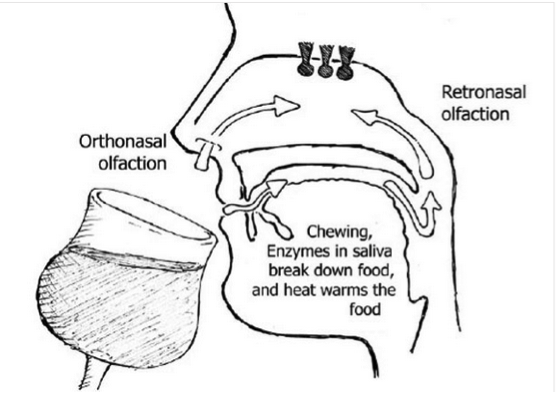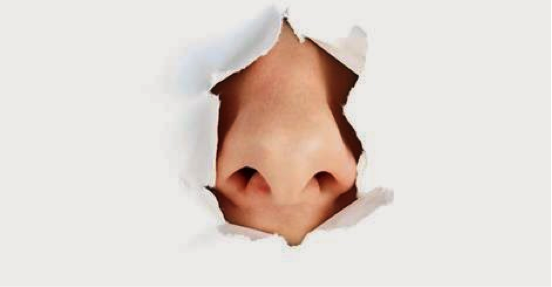
Source: http://health.usnews.com/health-news/articles/2016-02-12/a-sneeze-may-be-even-ickier-than-you-thought
Have you ever woken up with a stuffy nose and realized you couldn’t smell your food like you did the day before? Well, if you have had this experience, it is quite unsatisfying. You already don’t feel well and now you can’t even enjoy some of the comfort food you reach for to feel better. Suddenly, that chicken noodle soup is not so “chicken-noodle-soupy.” Catching a cold may not seem like such a big deal, especially since a loss of smell is often very short term. However, for a less fortunate few, olfactory loss can be long lasting, permanent, or even a sign of more debilitating diseases.
So why the dull flavor with blocked nostrils? What makes your flavor perception go wonky just from a stuffy nose and why is it a big deal?
It is thought that inflammation or swelling physically obstructs the nose, causing an impaired sense of smell known as anosmia. Historically, smelling was very important for survival to signal food sources or warn us of danger; as time progressed, those living in developed countries have found that adequate and safe food is a regular occurrence. This made smell less critical for food source identification and, instead, our sense of smell evolved to enhance enjoyment of food. Don’t get me wrong — smelling still helps us sense danger, like spoiled food, a gas leak, etc. It is simply not as crucial to survival as it used to be.

Source: https://memegenerator.net/instance/40652771
So…if we taste food in our mouth, why does it matter if we lose our sense of smell?
The reason a stopped-up nose makes our food taste dull is that smelling plays a significant role in flavor perception. If our perception of flavor were solely based on taste (sweet, sour, salty, bitter, umami, and fat) (Keast and Constanzo 2015), we would only experience five or six different taste perceptions, leading to a small list of choices that poorly describe the multifaceted flavor profiles of foods. So there have to be other cues helping to diversify our everyday flavor experiences.
The other piece of the flavor perception puzzle is our sense of smell’s dual nature. We perceive aromas when they are delivered through the nostrils (orthonasal), but we also perceive aromas through the oral cavity (retronasal), arising mostly from eating. Flavor perception is associated with retronasal aroma inhalation. This occurs when aroma stimuli reach the olfactory epithelium, or tissue lining the nasal cavity, through the mouth. Such a phenomenon arises mostly because we can push the volatiles inhaled through the oral cavity out of the nostrils, enabling flavor volatiles to reach olfactory epithelium and be processed for flavor perception.

Source: http://drinks.seriouseats.com/2013/06/cocktail-science-myths-about-ice-big-cubes-are-better-dry-shaking-whiskey-dilution.html
Since flavor perception directly relates to the movement of volatiles through the nose, one might see why a stuffy nose could inhibit adequate flavor perception. What if this loss of smell was more permanent? Permanent loss of one’s ability to smell can be seriously devastating to people dealing with chronic illness, where anosmia is a symptom or a long-term side effect of medication (Comeau et al 2001; Doty and Bromley 2004). Anosmia may also be a warning sign of more life-threatening ailments such as dementia, injury to the olfactory nerve, a deviated septum, or a viral infection.
Luckily a cold isn’t permanent and only temporarily inhibits your ability to sense when the trash should be taken out, if food is spoiled, and to perceive flavor. So the next time you become repulsed by an odor, consider it a gift; you’ll wish you could next time you come down with a case of temporary anosmia!
*If you are interested in learning more about research regarding anosmia and potential treatment please see this video clip provided by the Monell Center.
https://www.monell.org/research/anosmia
https://www.youtube.com/watch?v=wtAkWHN2xhc
References
Comeau TB, Epstein JB, Migas C. 2001. Taste and smell dysfunction in patients receiving chemotherapy: A review of current knowledge. Supportive Care in Cancer 9(8):575-80.
Doty RL and Bromley SM. 2004. Effects of drugs on olfaction and taste. Otolaryngol Clin North Am 37(6):1229-54.
Keast RS and Costanzo A. 2015. Is fat the sixth taste primary? evidence and implications. Flavour 4(1):1.






Leave a Reply